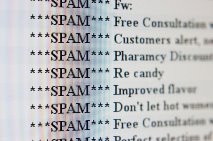Tuesday, November 18, 2008

Whilst unwanted electronic messages to
natural persons are already taboo in the Netherlands, as of July 2009,
spam will be completely prohibited - extending the illegality of spam
to cover companies and other organisations. Indeed, this is the result
of a modification to the existing Telecoms law.
Companies
or organisations continuing to spam after the 1st of July 2009 can be
punished with a maximum fine of 450,000€. If spam is still sent, then a
complaint is possible on the
spamklacht.nl
site. The OPTA (Independent Post and Telecoms Authority, the
Netherlands) will be supervising compliance to the law. Only upon
explicit permission to receive such electronic messages (including SMS
and faxes), can these be sent to the receiving party.
And what is the situation in Belgium?
In Belgium, permission is the general rule, with a limited number of exceptions.
With
the Belgian E-commerce law, the opt in rule for publicity electronic
messages is in effect. One can only send electronic messages for
publicity purposes where there is a preceding authorisation. Also, the
commercial communication, including its presentation, must be
immediately recognisable to the receiving party as being such upon
receipt of that communication. If this is followed, then it is
technically not spam.
However, the opt-in rule is subject to a few exceptions, making it a soft opt-in approach:
First Exception: Own customers/clients
The
rule is exempted where the commercial communication is aimed at the
organisation's own customers/clients (natural or legal persons). This
exception only applies in the following conditions:
a)
The organisation has directly obtained the contact data of the person
concerned in the course of a sale of a good/service. [NB: The privacy
law concerning the collection of such data must be respected].
b) The electronic contact data are exclusively used for similar products and/or services which the organisation itself provides.
c)
The organisation gives the customers (when the electronic data are
collected) the possibility of objecting to the use of such data in an
easy manner and free of charge.
Second Exception: Legal persons
The opt-in rule is exempted if the following 2 conditions are met:>
a) If the contact data is impersonal, and
b) If the product promoted is intended for that legal person.
Hence, by laying down these ground rules, one can surely see that there is no room for spamming.
So get the intended recipient's permission first if you can't resist sending that commercial communication of yours!
Category: